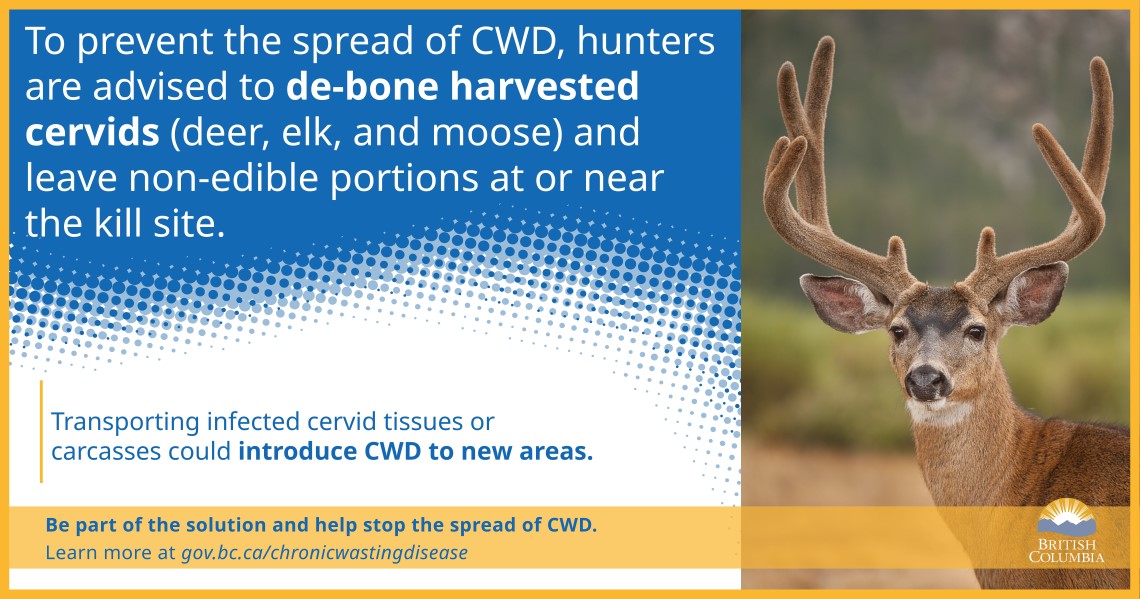Resources to learn more about Chronic Wasting Disease
Chronic Wasting Disease (CWD) is a fatal infection that affects species in the deer family (cervids) such as mule deer, white-tailed deer, elk, moose and caribou.
On this page
- Cause and symptoms of CWD
- CWD and potential human health risk
- Conservation risk for cervid populations
- What you need to know
- Resources to share
Cause and symptoms of CWD
CWD is caused by an abnormal protein called a prion, that accumulates in the central nervous system and causes a degenerative neurological disease (i.e. damage to the brain tissue). The disease can be transmitted through saliva, urine, feces, carcasses and even plants and soil. An infected animal may be contagious for months or years before appearing sick. The body does not recognize the protein as an infection so symptoms may take over a year after infection to show once damage to the brain has already occurred.
Signs of infection in deer include:
- Weight loss
- Poor coordination
- Stumbling and trembling
If you see an infected animal:
Please report to the 24/7 Report All Poachers and Polluters Line (1-877-952-7277) or the B.C. Wildlife Health program (250-751-3219).
CWD and potential human health risk
There is no direct evidence that CWD can be transmitted to humans. However public health experts recommend that any animal suspected or confirmed to have CWD should not be eaten as a precaution. For more information on CWD and the human health risk, visit:
- CWD and public health: BC Centre for Disease Control
- Information for butchers and hunters: BC Centre for Disease Control
Conservation risk for cervid populations
Population level impacts, such as shifts in age structure and declining numbers, are not likely to be observed for several years. It takes time for the disease to establish and reach a threshold of disease prevalence where these impacts start to take effect – this will happen quicker without management intervention.
Jurisdictions (e.g. Colorado, Wyoming) that have had the disease for several years and have reached these thresholds are now seeing significant and irreversible declines in both deer and elk populations.
The best defense against CWD is to detect it early and apply management tools as soon as possible to limit transmission and spread. Once CWD is introduced to a free-ranging cervid population it is virtually impossible to eradicate the disease completely.
What you need to know
Current distribution of CWD in North America
Visit the U.S.Geological Survey (USGS) page for a map of the current distribution of CWD in North America.
Information for hunters
- Learn about CWD hunting regulations and best practices
- Learn how and where to submit a sample for CWD testing
- Learn how to look up your CWD result
Information for ranchers
- Learn about how agricultural activities can spread CWD
Information for butchers
- Please refer to the BC Centre for Disease Control guidelines (PDF, 1MB)
- Learn more about safe game meat handling
Resources to share
Fact cards
The fact cards below are a series of images that can be printed or shared on websites or social media.
Additional fact cards
- CWD is caused by an abnormal protein called a prion (JPG, 177KB)
- CWD is found in species of the deer family, known as cervids (JPG, 179KB)
- An infected animal can shed the proteins that cause CWD into the environment (JPG, 191KB)
- Surveillance for CWD is important to detect the disease as early as possible (JPG, 191KB)
- An infected cervid carcass could introduce CWD into new ideas (JPG, 192KB)
- Early stages of CWD are not always obvious (JPG, 180KB)
Posters
Partners
Contact information
For wildlife-human interactions where public safety may be at risk call the Report All Poachers and Polluters (RAPP) line:
For wildlife health inquiries or reports:
250 751-3219
CWD@gov.bc.ca






